|
|
|
Sort Order |
|
|
|
Items / Page
|
|
|
|
|
|
|
| Srl | Item |
| 1 |
ID:
095849


|
|
|
| 2 |
ID:
059164
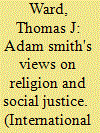

|
|
|
| 3 |
ID:
179341
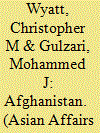

|
|
|
|
|
| Summary/Abstract |
This article is about the interplay of defining characteristics in Afghanistan that led to the fall of King Amanullah in 1929. Previously, this has been done by looking at the reforms, tribal society and the ulema, the community of scholars, but the prism through which we examine Amanullah's downfall is Mahmud Tarzi's grouping together of ‘Din, Daulat, Watan, Millat' (Religion, State, Homeland (or Fatherland), Nation). The ideals informing this grouping, as well as the concepts themselves, were key factors underpinning Amanullah’s reform agenda. Where Tarzi wrote of these factors as integrative and functioning together, a perspective taken uncritically by many commentators, we argue here that, as concepts in governance intended to unify the country, they acted as the exact opposite; that they sparked off each other, contradicted each other, and undermined each other in the context of the period. Understanding this explains much of the fragmentation Afghanistan suffered in the 1920s and suggests a structural process of causation for the fall of Amanullah.
|
|
|
|
|
|
|
|
|
|
|
|
|
|
|
|
| 4 |
ID:
132170
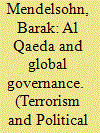

|
|
|
|
|
| Publication |
2014.
|
| Summary/Abstract |
In recent years, statements by al Qaeda leaders have included references to topics often associated with global-governance proponents' critique of the state. This article examines the organization's attitude toward symbols of global governance, giving particular attention to its view of the United Nations as the foundation for global governance, and to the manner in which al Qaeda approaches the central questions of environmental threats and human rights. The organization is seeking to insert itself into the discourse of global governance and use it in an instrumental manner; it focuses on anti-Western narrative and seeks to expose the existing order as designed by Western powers, particularly the United States, for self-serving reasons. However, the article argues, notwithstanding al Qaeda's reputation for sophistication in manipulating public opinion, the organization's references to global governance underscore the limitations its rigid ideology imposes on its messaging efforts. Even though adopting the global governance discourse is in line with the group's effort to improve its image, al Qaeda's extremist ideology limits its ability to take full advantage of the benefits this discourse offers.
|
|
|
|
|
|
|
|
|
|
|
|
|
|
|
|
| 5 |
ID:
068371


|
|
|
| 6 |
ID:
095584
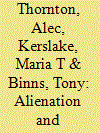

|
|
|
|
|
| Publication |
2010.
|
| Summary/Abstract |
This paper will explore social change in contemporary Samoan society with respect to the traditional expectations of the church and kinship conflicting with the modern needs of an urbanising population. In the Samoan way of life - the fa'aSamoa - religion, matai (chiefly system) and reciprocal 'gift-giving' kinship arrangements among the aiga (extended family) are fundamental and closely related elements. However, pressures from continued integration into the global economy, the importance of remittance income and related migration of well-educated and highly skilled Samoans overseas are presenting several challenges to the strongly held traditions of kinship and church obligations. Among these challenges, low-income households are increasingly placing the material well-being of the immediate household first, thus 'opting out' of the culturally defined primary obligation to the church and risk alienation from beneficial familial ties. As a result, settlement patterns are shifting towards leaseholds in urbanising Apia, with consequences, we will speculate, that may have deeper cultural implications. Our research revealed that the church has been slow to accept that, increasingly, Samoans are seeking relief from hardships that spirituality alone cannot address. However, given its influence, strengths and resources, the church is well positioned to take a lead role in facilitating opportunities for 'bottom-up', alternative development in Samoa, as well as providing lessons for church-led participatory approaches in the Pacific Island Region.
|
|
|
|
|
|
|
|
|
|
|
|
|
|
|
|
| 7 |
ID:
081257
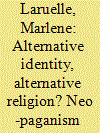

|
|
|
|
|
| Publication |
2008.
|
| Summary/Abstract |
As in all post-Soviet states, the Russian intelligentsia has been preoccupied with the construction of a new national identity since the beginning of the 1990s. Although the place of Orthodox religion in Russia is well documented, the subject of neo-paganism and its consequent assertion of an Aryan identity for Russians remains little known. Yet specialists observing the political and intellectual life of contemporary Russia have begun to notice that the development of references to 'Slavic paganism' and to Russia's 'Aryan' origin can be found in the public speeches of some politicians and intellectual figures. This article will attempt, in its first section, to depict the historical depth of these movements by examining the existence of neo-pagan and/or Aryan referents in Soviet culture, and focusing on how these discourses developed in different spheres of post-Soviet Russian society, such as those of religion, historiography, and politics
|
|
|
|
|
|
|
|
|
|
|
|
|
|
|
|
| 8 |
ID:
113277
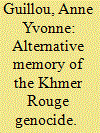

|
|
|
|
|
| Publication |
2012.
|
| Summary/Abstract |
This article contrasts the ways in which the memories of the Khmer Rouge genocide have been constructed at different levels and at different periods since the 1980s. Various actors have been involved in this construction, such as the ruling Cambodian People's Party, the Khmer Rouge Court sponsored by the United Nations since 2007, and Cambodian villagers. This has led to numerous misunderstandings and discrepancies regarding the trial of the former Khmer Rouge leaders. The current research is based on ethnographic fieldwork undertaken in a village in the province of Pursat. It shows how the villagers have taken care of the human remains from the state-sponsored memorials and of the mass graves (that is to say, of the unknown bodies). The article shows how the Khmer popular religious system is instrumental in forging a memory of the dead of the Pol Pot regime and in healing social suffering.
|
|
|
|
|
|
|
|
|
|
|
|
|
|
|
|
| 9 |
ID:
107459
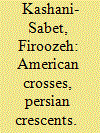

|
|
|
|
|
| Publication |
2011.
|
| Summary/Abstract |
The American public came to know Iran through its missionaries who had lived among the Persians. For their part, Iranians grew familiar with Americans through interactions with these missionary pioneers as well. While American Presbyterians quickly established and expanded their institutional presence in the country, it became abundantly clear to them that Muslim converts to Protestantism remained few and far between. Missionary perceptions of Iranian Muslims, however, left an indelible imprint on American public understanding of Iran and its people. The paper argues that religious ideology frequently colored perceptions and influenced policy-making. Even after more than a hundred years of interaction, cultural representations were refracted through religious difference and similarity. Despite the increasingly secular cultures of Iran and America in the early twentieth century, religion remained a salient ideology for the public in both societies-one that has had a profound impact on the nature of US-Iranian relations. Thus, it is important to analyze the origins and impact of this contact beginning in the nineteenth century.
|
|
|
|
|
|
|
|
|
|
|
|
|
|
|
|
| 10 |
ID:
135542
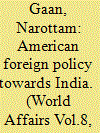

|
|
|
|
|
| Summary/Abstract |
This article contracts the American/Western judeo-Christian culture and its definition of the world with the traditional Asian/Eastern Indic perspective to explain major features of US policy towards developing countries in general and India in particular. American diplomacy so far has been dictated by the national belief in the superiority of biblical monotheism and US outreach is associated with the spread of judeo-christinity and the defeat of “paganism”. In the name of protecting religious freedom, the American government claims the right to monitor the status of religion in other countries and support Christian missionary organizations. This policy is also a tool to keep India and other countries in a subordinate role by expanding US influence in all field.
|
|
|
|
|
|
|
|
|
|
|
|
|
|
|
|
| 11 |
ID:
105362
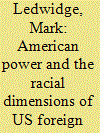

|
|
|
|
|
| Publication |
2011.
|
| Summary/Abstract |
This article consists of a critical discourse that examines the meteoric rise of Barack Obama within the context of international and domestic race relations. The article explores the impact of American racism on domestic and foreign affairs, in addition to providing contrasting viewpoints on the significance of Obama's election to the presidency. The article utilises the Obama phenomenon to assess US perceptions of the North-South divide, race, ethnicity, religion and anti-Americanism, in addition to unpacking the controversy surrounding Rev. Jeremiah Wright's characterisations of American power. The Obama campaign's post-9/11 context will be used to ascertain whether conservative efforts to associate Obama with Islam represent a conservative backlash that represents an ethnocentric re-articulation related to race, religion and the War on Terror, followed by an assessment of whether the Obama phenomenon is indicative of the perfectibility of US democracy, which would justify the exportation of American values. The article will engage in an interdisciplinary discourse grounded in political science, history and IR to provide the depth of knowledge and theoretical competency to frame the discussion in a historical and contemporary context that acknowledges Obama's relevance to domestic and international politics.
|
|
|
|
|
|
|
|
|
|
|
|
|
|
|
|
| 12 |
ID:
124934


|
|
|
|
|
| Publication |
New York, Three Rivers Press, 2010.
|
| Description |
xvii, 398p.Pbk
|
| Standard Number |
9780804139434
|
|
|
|
|
|
|
|
|
|
|
|
Copies: C:1/I:0,R:0,Q:0
Circulation
| Accession# | Call# | Current Location | Status | Policy | Location |
| 057497 | 294.50973/GOL 057497 | Main | On Shelf | General | |
|
|
|
|
| 13 |
ID:
165798
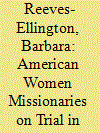

|
|
|
|
|
| Summary/Abstract |
On April 30, 1928, a court in the town of Bursa, Republic of Turkey, found three American mission-school teachers guilty of proselytizing in contravention of Turkish law.1 Edith Sanderson, Lucille Day, and Jeannie Jillson received a light punishment, a small fine, and a three-day imprisonment, which they were allowed to serve by being confined to school grounds. Yet the leniency of the judgment belied the magnitude of the case during a tectonic shift in local politics that reverberated across the Atlantic.
|
|
|
|
|
|
|
|
|
|
|
|
|
|
|
|
| 14 |
ID:
111019
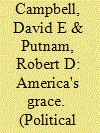

|
|
|
|
|
| Publication |
2011.
|
| Summary/Abstract |
David E. Campbell and Robert D. Putnam ask how America can simultaneously be religiously devout, religiously diverse, and religiously tolerant. They argue that America's relative religious harmony lies in the frequency of "religious bridging." Almost all Americans have a friend or close family member of another religion, and these personal relationships keep America's religious melting pot from boiling over.
|
|
|
|
|
|
|
|
|
|
|
|
|
|
|
|
| 15 |
ID:
069019
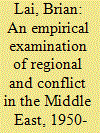

|
|
|
| 16 |
ID:
069107
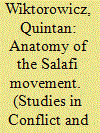

|
|
|
| 17 |
ID:
110761
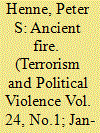

|
|
|
|
|
| Publication |
2012.
|
| Summary/Abstract |
Does religion lead to greater destructiveness from suicide terrorism? And if so, how does it influence this form of political violence? Recent analyses of terrorism point to the significance of religion, but are divided as to whether religion itself matters, or certain types of religious terrorist groups are actually driving suicide terrorist violence. This article draws on social movement theory and recent work in the study of suicide terrorism to argue that religion influences the severity of suicide terrorist attacks as an ideology groups use to justify their struggle and gain public support. This effect occurs regardless of a group's goals or organizational nature. The theory is tested using a generalized estimating equation to account for multiple attacks by several groups. The study finds that the religious ideology of a group greatly increases the number of deaths from a suicide attack, even if varying group motivations and structural factors are taken into account. The article helps to clarify the effect of religion on contemporary terrorism, contributing to the study of both terrorism and religion and politics.
|
|
|
|
|
|
|
|
|
|
|
|
|
|
|
|
| 18 |
ID:
126041
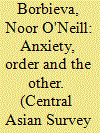

|
|
|
|
|
| Publication |
2013.
|
| Summary/Abstract |
Neither well-being nor suffering can be understood without understanding how the two experiences are related. In this paper, the author focuses on the experiences of well-being and suffering in everyday, mundane contexts, such as food preparation, cleaning and hospitality. Data presented are drawn from fieldwork conducted among ethnic Kyrgyz and Uzbeks in southern Kyrgyzstan, shortly after independence. The author discusses how the experiences of well-being and suffering are informed by symbolic systems that are linked to religious beliefs. This examination contributes to an understanding of the power of religious symbols, arguing that the expectations of well-being or suffering make systems of religious symbols more compelling.
|
|
|
|
|
|
|
|
|
|
|
|
|
|
|
|
| 19 |
ID:
066229


|
|
|
| 20 |
ID:
076016
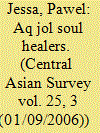

|
|
|
|
|
|
|
|